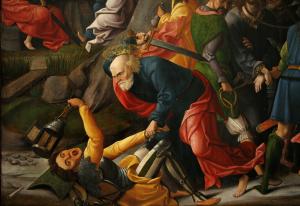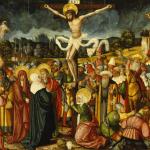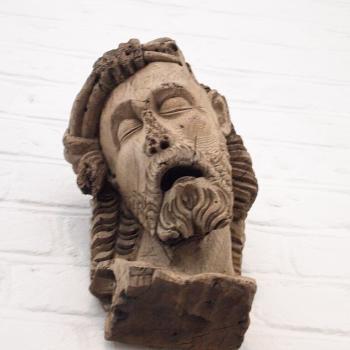
Jesus’s fame and popularity among the people of Israel had gone to new heights. After he raised Lazarus from the dead, he entered into Jerusalem with the people showing, “Hosanna, blessed is He who comes in the name of the Lord!”
Jesus’s disciples had to feel the tingling of pride as they saw their Master being glorified by the people. They were with him. They were his closest associates. Surely, the time had come; Jesus had been preaching that the kingdom of God was at hand. Jesus was ready to make his move. Jesus was going to fulfill his destiny. They would find their own glory as they took their rightful place next to him. All the arguments as to who would be at his right hand and left hand, who among them would be his greatest disciple and so the greatest in the messianic kingdom under Christ himself, demonstrate to us the confused spirit which held even the best of his disciples. They knew he was the Christ but they continued to look at him with very limited understanding.
When Jesus made his way to the Temple, everyone was ready to see what he would do next. Surely, it must have surprised many to see him casting out the moneylenders, showing his anger at what had become of the Temple itself. But others would not be detoured, for they understood that a precedent for Jesus’s actions could be seen in the history of Israel, in the way the prophets treated the Temple and its priests. Previously, God’s wrath called forth for a cleansing of the Temple, indeed, a cleansing of the whole of Israel, and at that time, the prophets found their message unwelcome and their lives put into jeopardy. God showed, through the Babylonian Captivity, that the prophets had spoken truly: Israel had been cleansed from its impurity. Those who continued to follow Jesus, despite the apparent scandal of his actions, had to believe that Jesus was continuing and fulfilling the mission of the prophets. He was the messiah. He had come to Jerusalem to fulfill the messianic prophecies. Obviously, he would be interested in purifying the Temple so that Israel, purifying its worship, so that it would be ready for the messianic kingdom.
But then, Jesus did not act as they expected. Yes, he preached, even acted, with authority. Yet, he did not make the move which everyone expected. They were expecting a messianic king who would take Israel to new heights, where its relationship with Rome would be reversed. Instead, Jesus started to act strange. He called his disciples to the mystical supper at which he proclaimed he was going to be betrayed and then die, treated like the Passover lamb.
Then, just as he said he would be, he was betrayed. Judas came, and the authorities arrested Jesus, not without incident:
While he was still speaking, Judas came, one of the twelve, and with him a great crowd with swords and clubs, from the chief priests and the elders of the people. Now the betrayer had given them a sign, saying, “The one I shall kiss is the man; seize him.” And he came up to Jesus at once and said, “Hail, Master!” And he kissed him. Jesus said to him, “Friend, why are you here?” Then they came up and laid hands on Jesus and seized him. And behold, one of those who were with Jesus stretched out his hand and drew his sword, and struck the slave of the high priest, and cut off his ear. Then Jesus said to him, “Put your sword back into its place; for all who take the sword will perish by the sword. Do you think that I cannot appeal to my Father, and he will at once send me more than twelve legions of angels? But how then should the scriptures be fulfilled, that it must be so?” At that hour Jesus said to the crowds, “Have you come out as against a robber, with swords and clubs to capture me? Day after day I sat in the temple teaching, and you did not seize me. But all this has taken place, that the scriptures of the prophets might be fulfilled.” Then all the disciples forsook him and fled (Matthew 26:47-56 RSV).
It is in the Gospel of John we find that it was none other than Peter who used the sword to cut off the ear of the high priest’s slave, Malchus:
Then Simon Peter, having a sword, drew it and struck the high priest’s slave and cut off his right ear. The slave’s name was Malchus. Jesus said to Peter, “Put your sword into its sheath; shall I not drink the cup which the Father has given me?” (Jn. 18:10-11 RSV).
Jesus’s time for glory had come, but it was not the glory which Peter and the other disciples expected. Instead of Jesus coming into power with might which would make the authorities tremble, it was the authorities who came at Jesus, making Jesus’ disciples tremble. Peter was ready for a fight; he thought that the eschatological war had begun, and so he struck Malchus’ ear, only to be told to put away his sword. Jesus, knowing what was in Peter’s mind, warned him not to think of the kingdom of God in such a fashion. Jesus had come to reveal the glory of God, but that glory was not to be found in the way of death and violence. Jesus warned Peter he was not to put any trust in the sword, that is, in any weapon of violence, because those who attach themselves to violence shall suffer the consequences of that violence themselves: by embracing the power of death, death will continue to hold away over them.
Peter, far from receiving the approval he expected from Jesus, heard Jesus’ prophetic condemnation of the sword and all the violence it represents. Peter had a good intention with his action, but the action itself met with Jesus’s stern rebuke. Thus, as St. Augustine understood, we learn to consider what our actions entail. We might have good intentions, like defending Christ, but if our defense takes up violence, if our defense takes up the power of death and destruction, we too shall find Jesus’ disapproval, just as Peter did in the garden:
But when healing came, liberty also was shadowed forth. Peter’s deed, however, was disapproved of by the Lord, and He prevented Him from proceeding further by the words: “Put up your sword into the sheath: the cup which my Father has given me, shall I not drink it?” For in such a deed that disciple only sought to defend his Master, without any thought of what it was intended to signify. And he had therefore to be exhorted to the exercise of patience, and the event itself to be recorded as an exercise of understanding.[1]
Jesus reacted to Peter the way God had reacted to Israel before the Babylonian Exile (cf. Ezek. 17:10-21). The people of Israel thought they could defend themselves, and the Temple, by relying upon the might of Egypt. They put their trust, not in God, but in arms. Their hearts were impure. Their hearts were with the might of the sword, and they saw the results of that trust as they were brutally slaughtered. By living by the sword, by trusting in the sword, their hearts were far away from God and trust in God and God’s ways, and so they suffered the consequences of their lack of faith. Those who survived the sword found themselves taken away from their homeland. Likewise, Peter had yet to learn the lesson of the Babylonian Exile. He thought he was to take up the sword, to put his trust in it, to defend himself and his Lord from the might of Rome. Peter struck Malchus, only to see Jesus heal Malchus’ ear while being warned that he should not take up the sword because it only leads to death and ruin.
Likewise, Peter was to learn from this example that he should not take up the spiritual sword in vain. That is, just as the one who lives by violence shall risk their own destruction, so those who pick up the spiritual sword and try to use it against others, in an attitude of judgment and condemnation of others, shall receive the thrust of that sword themselves. “Judge not, that you be not judged. For with the judgment you pronounce you will be judged, and the measure you give will be the measure you get” (Matt. 7:1-2 RSV).
Peter, like all Christians, was called to transcend the way of the sword, the way of violence and death, as Christians must work not for the true realization of the presence of the kingdom of God in the world. Just as Jesus fulfilled the messianic prophecy with his death and resurrection, so Christians are called to experience the kingdom of God, not with might, not with condemnation, but with the glory found in the wake of the cross.
On the night in which Jesus was betrayed, he was betrayed not only by Judas, but by Peter himself. But the betrayal was different. Peter, and the disciples, had misunderstood Jesus. They thought that Jesus wanted to be defended by the sword. Judas, on the other hand, had other intentions; perhaps it was greed and disillusionment which led him to sell out Jesus, or perhaps his hope that he would force Jesus to act, to become the messiah Judas and the disciples and the people of Israel expected. It is hard to tell his motivation. We can only guess. But it is clear, Jesus responded with the rejection of violence, a rejection which can be seen expressed by the prophets before him. At the time of his glory, he was threatened by the pretend glory of human might. As a result of Peter’s actions, God spoke out once again, this time for all time, about the error of violence. That is through Peter, he told the world that the solution to arms is not more arms: the more arms people take up, the more they will be threatened by and face the destruction by the arms of others. The solution to the threat of arms is to disarm, to put away all arms so that the cycle of violence can come to an end.
Truly, Jesus revealed himself as the Prince of Peace in the garden! The temptation to violence, the temptation to take on the world for a man-made glory, was overcome. The sword was put away, so that Jesus could finally enter his kingdom in glory.
[1] St. Augustine, Tractates on John in NPNF1(7):417 [Tractate 112].
Stay in touch! Like A Little Bit of Nothing on Facebook.
If you have liked what you read, please consider sharing it with your friends and family!












